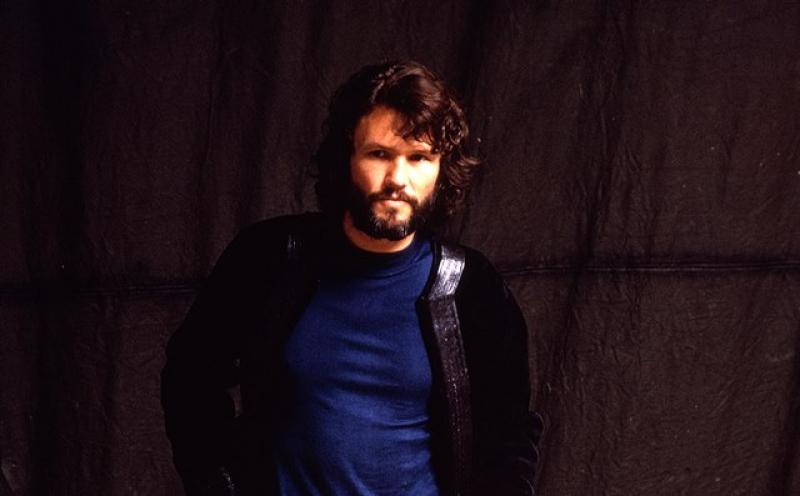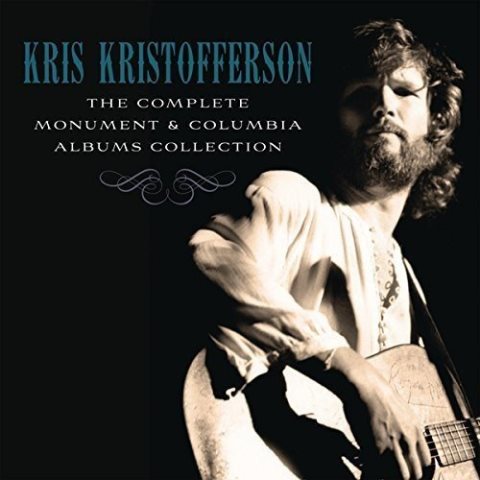Reissue CDs Weekly: Kris Kristofferson | reviews, news & interviews
Reissue CDs Weekly: Kris Kristofferson
Reissue CDs Weekly: Kris Kristofferson
A whole heap of the country-fried singer-songwriter proves too much

If Kris Kristofferson had just been the writer of “Help Me Make It Through the Night”, “Me and Bobby McGee” and “Sunday Mornin’ Comin’ Down”, his legacy would have been assured. Each song is a classic, and each is wonderful. Elvis Presley and Gladys Knight & the Pips ensured that “Help Me Make It Through the Night” would live forever. Kristofferson’s ex-girlfriend Janis Joplin did the same with “Me and Bobby McGee” – the writer did not initially know she had recorded it.
But as this brick-sized, 16-disc, clamshell set demonstrates there was more to Kristofferson than the songs others chose to cover. While Kristofferson and its follow-up The Silver Tongued Devil and I (1971) are the only essential albums collected (and the only ones where he appears on the sleeve without a beard), the fact that he was and is a singer and songwriter whose approach crossed boundaries is inescapable. “Help Me Make It Through the Night” lent itself to a soul interpretation as much as it did one rooted in country. The nexus of country and soul has long been acknowledged, but Kristofferson was as essential to the bleed between the genres as William Bell or songwriter/producer Dan Penn.
 The Complete Monument & Columbia Album Collection collects the 11 albums he made for the Monument and Columbia labels from 1970 to 1981: one, 1974’s Breakaway, was a co-credit with his then-wife Rita Coolidge. Each album comes in a shrunken facsimile of the original album’s sleeve. Disc 12 is the first-ever issue of the complete recordings of a 1970 Big Sur concert. Disc 13 is a previously unreleased live-in-the-studio session from 1972. Disc 14 is the live set Live at the Philharmonic, which was first issued in 1992. Although the annotation does not say so, it was recorded in December 1972. Disc 15 compiles tracks from singles, compilation albums and bonuses from previous CD editions. Disc 16 collects 16 previously unreleased demos. The two live discs (all but two tracks of Disc 13) and the disc of demos are the only previously unheard material. This is a lot of Kris Kristofferson. The price is £75.
The Complete Monument & Columbia Album Collection collects the 11 albums he made for the Monument and Columbia labels from 1970 to 1981: one, 1974’s Breakaway, was a co-credit with his then-wife Rita Coolidge. Each album comes in a shrunken facsimile of the original album’s sleeve. Disc 12 is the first-ever issue of the complete recordings of a 1970 Big Sur concert. Disc 13 is a previously unreleased live-in-the-studio session from 1972. Disc 14 is the live set Live at the Philharmonic, which was first issued in 1992. Although the annotation does not say so, it was recorded in December 1972. Disc 15 compiles tracks from singles, compilation albums and bonuses from previous CD editions. Disc 16 collects 16 previously unreleased demos. The two live discs (all but two tracks of Disc 13) and the disc of demos are the only previously unheard material. This is a lot of Kris Kristofferson. The price is £75.
Kristofferson’s path is fascinating. By his first album, he had studied to Master’s level at Oxford in the Fifties, boxed, played rugby, could have been a teacher and spent five years in the military. He was in his thirties when he began seriously pushing himself as a musician and songwriter in Nashville. His voice can be as distinct as the best of his aching songs. He has always been an activist. He has acted. But as this set shows from 1975’s Who’s to Bless and Who’s to Blame album onwards, his music and songs have little edge and lack memorable melodies. A Kenny Rogers-esque unctuousness creeps in as the Eighties loom. So does a cornball approach to country. This, though, is the curse of a set of this nature. Completeness comes with a warts-and-all caveat. Uniting with Johnny Cash, Waylon Jennings and Willie Nelson in 1994 in the quartet which became known as The Highwaymen was a good move.
Of the live sets, Live at the Big Sur Folk Festival is the most engaging as Kristofferson is working off the audience’s energy. Live at the RCA Studios 1972 is interesting but a little stilted. Nowhere in the package is it explained why this was recorded.
There is also no information about the demos collected on Disc 16, which is effectively an echo of the fine 2010 set Please Don’t Tell Me How the Story Ends: The Publishing Demos 1968-72. Judging by the inclusion of “Gypsy Rose and I Don't Give a Curse”, which The Kingston Trio recorded in 1993, they could date from no earlier than the early Nineties. Aside from “Gypsy Rose…” only one track has otherwise been heard: “Bread for the Body (and Food for the Soul)” was on Kristofferson’s 2012 Feeling Mortal album. Beyond sounding like they weren't recorded in the Seventies or Eighties, it is impossible to guess when these demos were taped. None are solo. Differing instruments feature and the levels of production vary from none to a borderline gloss; they are not from a single session. While the booklet includes a good essay and brief tributes from Monument’s founder Fred Foster and producer Don Was, the text does not discuss the previously unreleased material. Like the omissions in the annotation, this is another unfortunate oversight. Money is being asked for this release and it is incumbent upon those behind it to detail what they are selling.
The Complete Monument & Columbia Album Collection is no entry point into Kris Kristofferson. It could not be: for that, seek out his first two albums. But if an unexpurgated picture is needed, head here.
Share this article
The future of Arts Journalism
You can stop theartsdesk.com closing!
We urgently need financing to survive. Our fundraising drive has thus far raised £49,000 but we need to reach £100,000 or we will be forced to close. Please contribute here: https://gofund.me/c3f6033d
And if you can forward this information to anyone who might assist, we’d be grateful.

Subscribe to theartsdesk.com
Thank you for continuing to read our work on theartsdesk.com. For unlimited access to every article in its entirety, including our archive of more than 15,000 pieces, we're asking for £5 per month or £40 per year. We feel it's a very good deal, and hope you do too.
To take a subscription now simply click here.
And if you're looking for that extra gift for a friend or family member, why not treat them to a theartsdesk.com gift subscription?
more New music
 Slovenian avant-folk outfit Širom’s 'In the Wind of Night, Hard-Fallen Incantations Whisper' opens the door to inner space
Unconventional folk-based music which sounds like nothing else
Slovenian avant-folk outfit Širom’s 'In the Wind of Night, Hard-Fallen Incantations Whisper' opens the door to inner space
Unconventional folk-based music which sounds like nothing else
 'The Art of Loving': Olivia Dean's vulnerable and intimate second album
Neo soul Londoner's new release outgrows her debut
'The Art of Loving': Olivia Dean's vulnerable and intimate second album
Neo soul Londoner's new release outgrows her debut
 Music Reissues Weekly: The Peanut Butter Conspiracy - The Most Up Till Now
Definitive box-set celebration of the Sixties California hippie-pop band
Music Reissues Weekly: The Peanut Butter Conspiracy - The Most Up Till Now
Definitive box-set celebration of the Sixties California hippie-pop band
 Doja Cat's 'Vie' starts well but soon tails off
While it contains a few goodies, much of the US star's latest album lacks oomph
Doja Cat's 'Vie' starts well but soon tails off
While it contains a few goodies, much of the US star's latest album lacks oomph
 Mariah Carey is still 'Here for It All' after an eight-year break
Schmaltz aplenty but also stunning musicianship from the enduring diva
Mariah Carey is still 'Here for It All' after an eight-year break
Schmaltz aplenty but also stunning musicianship from the enduring diva
 Album: Solar Eyes - Live Freaky! Die Freaky!
Psychedelic indie dance music with a twinkle in its eye
Album: Solar Eyes - Live Freaky! Die Freaky!
Psychedelic indie dance music with a twinkle in its eye
 Album: Night Tapes - portals//polarities
Estonian-voiced, London-based electro-popsters' debut album marks them as one to watch for
Album: Night Tapes - portals//polarities
Estonian-voiced, London-based electro-popsters' debut album marks them as one to watch for
 Album: Mulatu Astatke - Mulatu Plays Mulatu
An album full of life, coinciding with a 'farewell tour'
Album: Mulatu Astatke - Mulatu Plays Mulatu
An album full of life, coinciding with a 'farewell tour'
 Music Reissues Weekly: Sly and the Family Stone - The First Family: Live At Winchester Cathedral 1967
Must-have, first-ever release of the earliest document of the legendary soul outfit
Music Reissues Weekly: Sly and the Family Stone - The First Family: Live At Winchester Cathedral 1967
Must-have, first-ever release of the earliest document of the legendary soul outfit
 Album: Robert Plant - Saving Grace
Mellow delight from former Zep lead
Album: Robert Plant - Saving Grace
Mellow delight from former Zep lead
 Brìghde Chaimbeul, Round Chapel review - enchantment in East London
Inscrutable purveyor of experimental Celtic music summons creepiness and intensity
Brìghde Chaimbeul, Round Chapel review - enchantment in East London
Inscrutable purveyor of experimental Celtic music summons creepiness and intensity
 Album: NewDad - Altar
The hard-gigging trio yearns for old Ireland – and blasts music biz exploitation
Album: NewDad - Altar
The hard-gigging trio yearns for old Ireland – and blasts music biz exploitation

Add comment